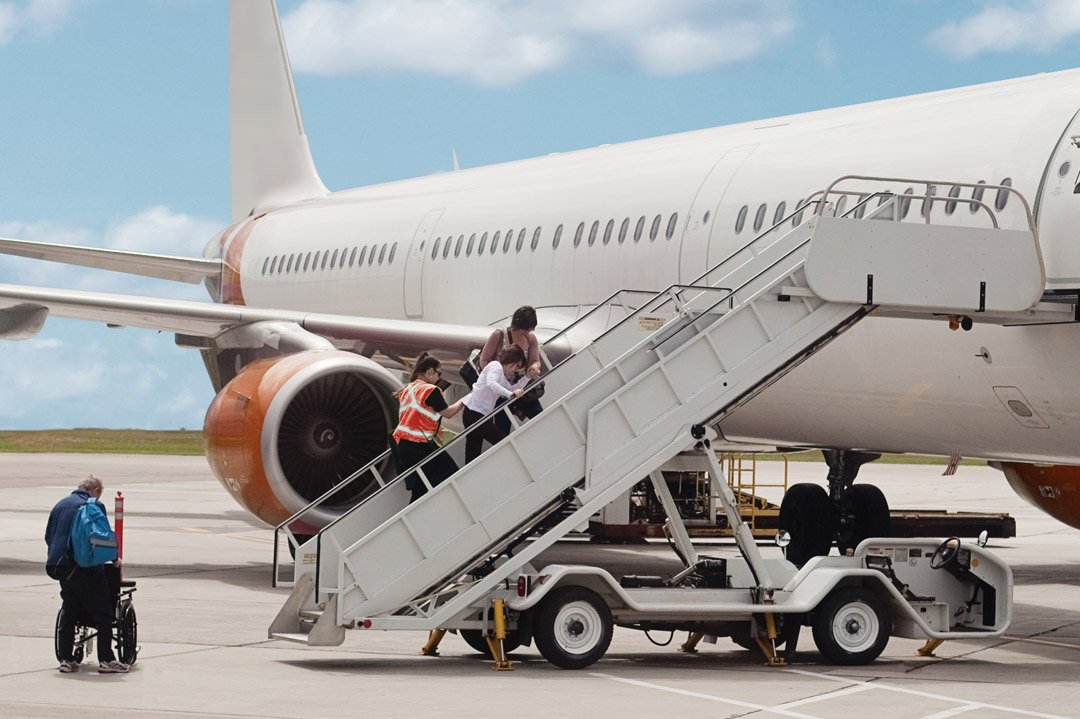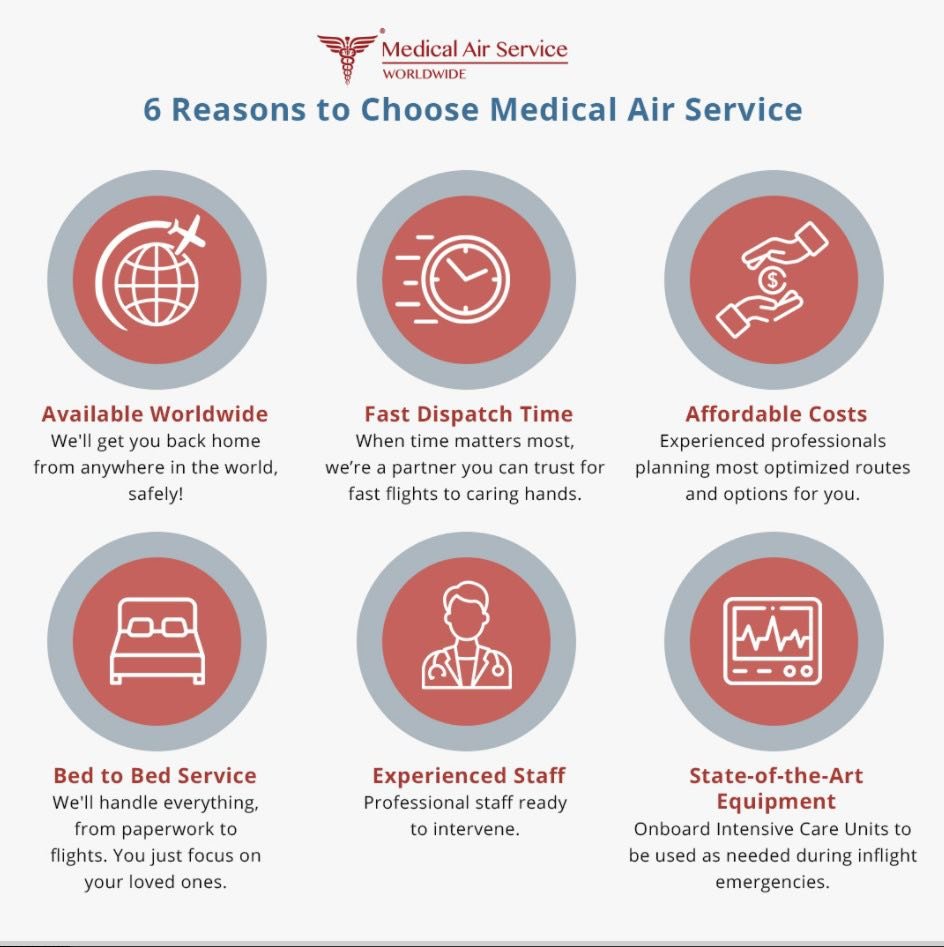Reading Time: 4 minutes
Table of contents
- Medical Repatriation flights: Do you qualify?
- Medical requirements for a medical repatriation
- Medical repatriation by ambulance aircraft or helicopter
- Medical repatriation by ground ambulance
- Medical repatriation in a scheduled airliner
- Repatriation Requirements: Stipulations for the insurance company taking over the air ambulance costs
- Organizational requirements for a medical repatriation
- Contact us
Medical Repatriation flights: Do you qualify?
Under what conditions is a medical repatriation possible? Who qualifies for medical repatriation?
These questions are probably asked by many patients who have been seriously ill or have had an accident during a stay abroad. Depending on the situation, different aspects play a role: the health of the traveler determines the feasibility of the transport. However, the conditions under which their insurance company will cover the costs of medical repatriation are equally important for some patients. Last but not least, organizational conditions must be met, where necessary.
In summary, the conditions for medical repatriation are the following:
- The patient must be fit-to-fly
- Proper organizational process organized by an air ambulance company for a smooth flight
- Insurance covering air ambulance services is not required for the air transport. In that case, the cost must be borne out-of-pocket or via other sources such as crowdfunding.
Let's look at these points in more detail.

Medical requirements for a medical repatriation
A basic requirement for any medical repatriation is that the patient is fit to travel. In the case of ambulance flights, doctors often refer to the need for a patient to be ‘fit to fly’. In other words, the patient's state of health must permit safe transport via an air ambulance. This is almost always the case for medical repatriations whether it is by ambulance aircraft or helicopter. Patient transportation in a scheduled airliner is subject to more comprehensive medical requirements.
Medical repatriation by ambulance aircraft or helicopter
Both ambulance aircraft and ambulance helicopters are fitted with medical equipment that is similar to that of a modern intensive care unit. As a specialized doctor is onboard the air ambulance, the patient is expertly cared for at all times. This means that medical care is always available, even for intensive care patients even while mid-air.
Even if the changes in air pressure during a regular flight would cause health problems (e.g. for patients with pneumothorax, anaemia or severe pneumonia), patient transportation in an ambulance aircraft or helicopter can take place without any issues: a helicopter flies so low anyway that there are no significant changes in air pressure. In an ambulance aircraft, on the other hand, technical measures can be taken to adjust the air pressure of the cabin to be close to the ground level air pressure. A Sea Level Flight like this enables the transportation of patients whose condition would worsen at a lower air pressure.
In practice, an air ambulance plane is usually used for transporting severely ill patients. Helicopters have a significantly shorter range, so they are most often used to fly short distances.
Medical repatriation by ground ambulance
Modern medical equipment is also standard in a ground ambulance. This means that in many cases ambulance transportations for patients are possible, but the time taken to cover the trip is an important factor. Since the medical repatriation journey takes considerably longer than by air, the patient is exposed to a higher level of stress. Therefore, it is much better for intensive care patients to be transported in an air ambulance.
Medical repatriation in a scheduled airliner
 Carrying out a medical repatriation in a scheduled airliner is subject to additional conditions. The scheduled airlines reserve the right to thoroughly check the patient's health status and to refuse transport if there is a risk to the patient or other passengers. Therefore, only patients whose condition is stable are suitable for medical repatriation in a scheduled airliner – either lying down on a stretcher or sitting in a Business Class seat.
Carrying out a medical repatriation in a scheduled airliner is subject to additional conditions. The scheduled airlines reserve the right to thoroughly check the patient's health status and to refuse transport if there is a risk to the patient or other passengers. Therefore, only patients whose condition is stable are suitable for medical repatriation in a scheduled airliner – either lying down on a stretcher or sitting in a Business Class seat.
Further stipulations for medical repatriations by scheduled airliner are:
- The medical repatriation usually takes place on a direct flight as it is complicated to coordinate a patient transport efficiently on connecting routes. In addition, transferring in between flights is too much of a burden for the patient.
- The flight must be a medium or long-haul flight: on short routes, the aircraft usually has to take off again so soon in the opposite direction that there is no time to install a patient bed. Since Business Class on short-haul routes often consists of regular rows of seats in which the middle seat remains unoccupied, in many cases there is not enough room for manoeuvre to allow the medical staff to care for the patient adequately during the flight.
- Medical repatriation in a scheduled airliner requires a lead time of 1 to 2 days. The airline requires this amount of time to decide whether it will accept the patient onboard the plane.
Repatriation Requirements: Stipulations for the insurance company taking over the air ambulance costs
For many patients, deciding on a medical repatriation is not only linked to health considerations but also to financial obstacles. Most patients hope that their insurer will take over the costs of the medical flight in full, or at least in part. However, this is often tied to conditions that are set out in the coverage policy.
First of all, it is important that a valid international travel insurance policy (with sufficient health coverage) is in place. Anyone who hopes that their private health insurance or statutory national health insurance will cover the costs is likely to be disappointed. Medical repatriations are not covered in most countries.
But even your travel insurance provider will not automatically take over the costs for every medical transport. Depending on the exact wording of the insurance policy, the costs will be covered in medically reasonable cases or only in medically necessary cases. A medical repatriation is considered medically reasonable if better treatment outcomes are to be expected in the patient’s home country than in the country they are staying in. This is often the case because familiar environments can positively influence the patient's recovery process or because of the level of care and appropriate facilities available.
On the other hand, the stipulation for a medically necessary medical repatriation is that appropriate treatment is not possible in the country the patient is staying in. This is much less common, because the healthcare systems of many countries have now progressed to the point that most diseases and injuries can be treated in principle. However, the quality of medical treatment abroad is often well below the standard that the patient is used to in their home country. Nevertheless, a coverage policy that stipulates that medical necessity is required for medical repatriation often allows insurers to refuse to take over the costs in an emergency.
Important: It should be noted that insurance coverage or an air ambulance membership is not required by a company offering medical transport services. In most cases when the insurance company refuses to cover the costs, a medical repatriation can still be carried out by the air ambulance company. Just contact us and we will advise you on your options.
Organizational requirements for a medical repatriation
The organisational elements of a medical repatriation are extremely straightforward if you have an experienced air ambulance provider like Medical Air Service at your side. As with any trip abroad, you will need a valid passport. In addition, you will need confirmation from a hospital in your home country that you can be admitted there. If you have not selected a hospital yet, we will gladly assist you in searching for a suitable hospital for you.
In fact, you can rely on us to relieve you of the burden of organising all aspects of the medical flight via air ambulance. We will take care of every detail in planning and carrying out the medical transport, so you don’t have to spend time worrying about the organisational requirements.
Regardless of insurance approval or coverage, we are able to air transport patients via our air ambulances. Being a lifeflight expert, our medical transport services include transportation from your home/hospital by road. We organize missions with or without insurance.

Contact us
If you find yourself in need of an air ambulance or a repatriation company, get in touch with us. Our team is available 24/7 to provide you the support you deserve and will advise you on the form of medical transportation you need
Get in touch now